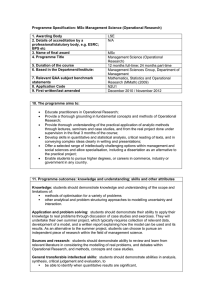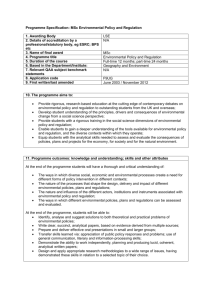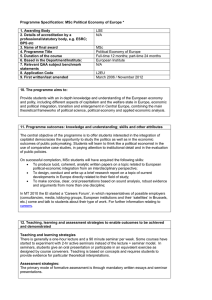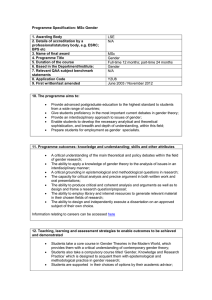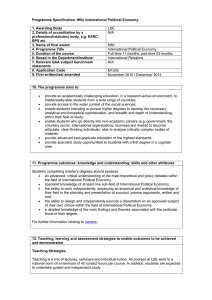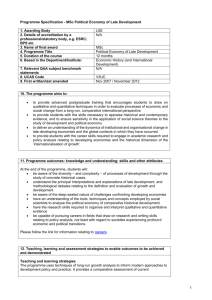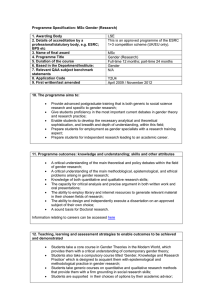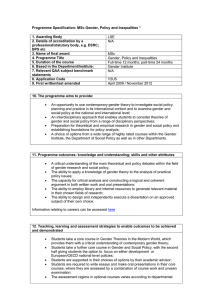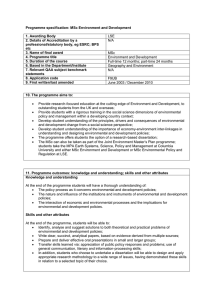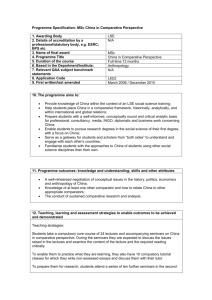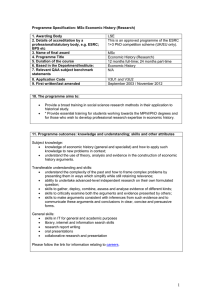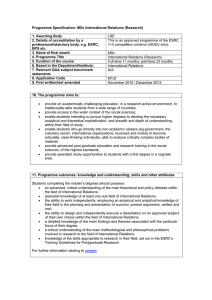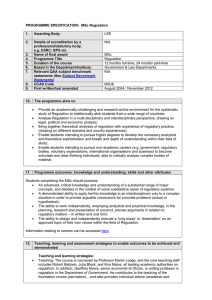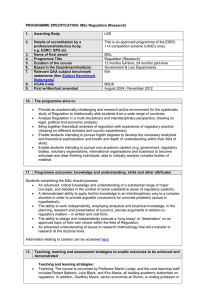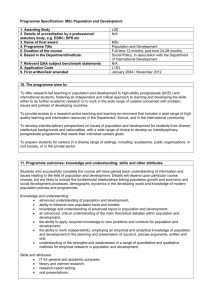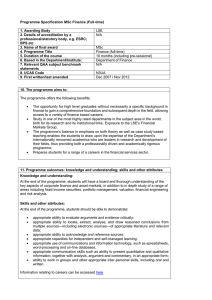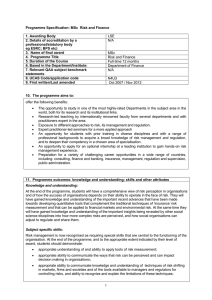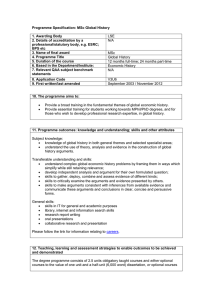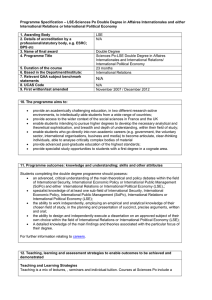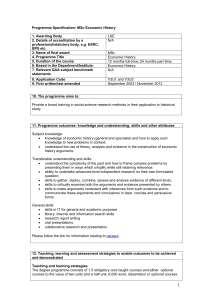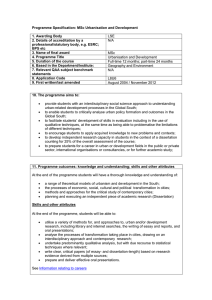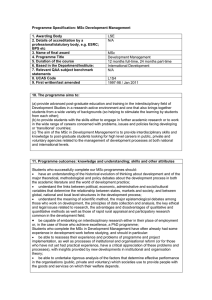MSc Management Science (Decision Sciences)
advertisement
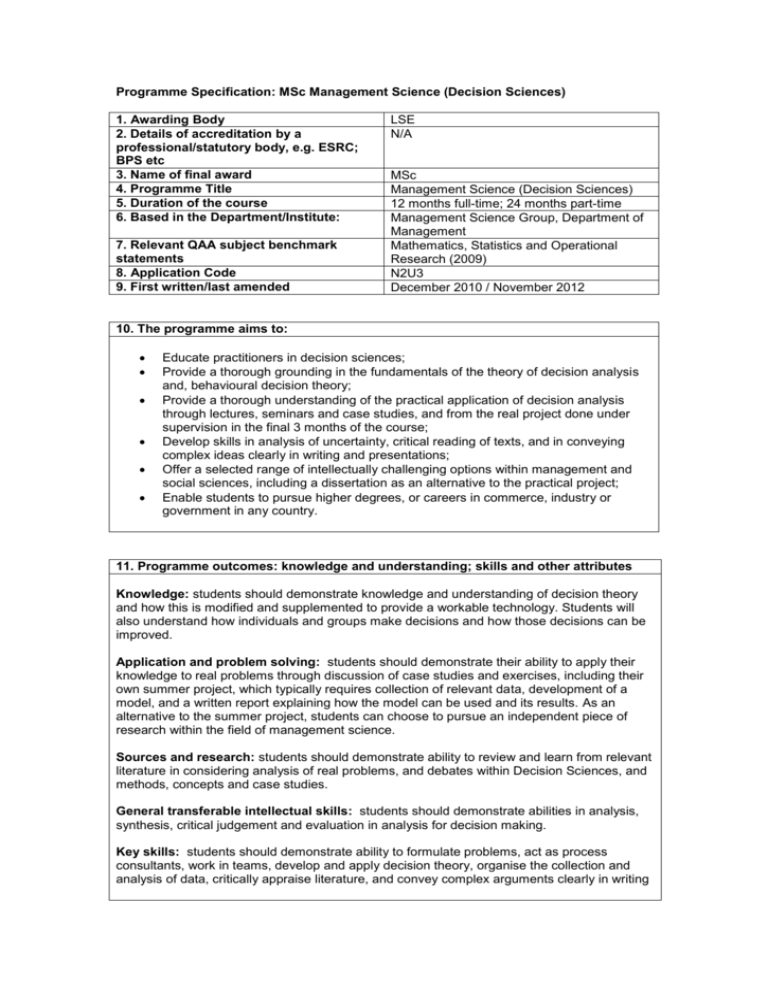
Programme Specification: MSc Management Science (Decision Sciences) 1. Awarding Body 2. Details of accreditation by a professional/statutory body, e.g. ESRC; BPS etc 3. Name of final award 4. Programme Title 5. Duration of the course 6. Based in the Department/Institute: 7. Relevant QAA subject benchmark statements 8. Application Code 9. First written/last amended LSE N/A MSc Management Science (Decision Sciences) 12 months full-time; 24 months part-time Management Science Group, Department of Management Mathematics, Statistics and Operational Research (2009) N2U3 December 2010 / November 2012 10. The programme aims to: Educate practitioners in decision sciences; Provide a thorough grounding in the fundamentals of the theory of decision analysis and, behavioural decision theory; Provide a thorough understanding of the practical application of decision analysis through lectures, seminars and case studies, and from the real project done under supervision in the final 3 months of the course; Develop skills in analysis of uncertainty, critical reading of texts, and in conveying complex ideas clearly in writing and presentations; Offer a selected range of intellectually challenging options within management and social sciences, including a dissertation as an alternative to the practical project; Enable students to pursue higher degrees, or careers in commerce, industry or government in any country. 11. Programme outcomes: knowledge and understanding; skills and other attributes Knowledge: students should demonstrate knowledge and understanding of decision theory and how this is modified and supplemented to provide a workable technology. Students will also understand how individuals and groups make decisions and how those decisions can be improved. Application and problem solving: students should demonstrate their ability to apply their knowledge to real problems through discussion of case studies and exercises, including their own summer project, which typically requires collection of relevant data, development of a model, and a written report explaining how the model can be used and its results. As an alternative to the summer project, students can choose to pursue an independent piece of research within the field of management science. Sources and research: students should demonstrate ability to review and learn from relevant literature in considering analysis of real problems, and debates within Decision Sciences, and methods, concepts and case studies. General transferable intellectual skills: students should demonstrate abilities in analysis, synthesis, critical judgement and evaluation in analysis for decision making. Key skills: students should demonstrate ability to formulate problems, act as process consultants, work in teams, develop and apply decision theory, organise the collection and analysis of data, critically appraise literature, and convey complex arguments clearly in writing and presentations. See information relating to careers. 12. Teaching, learning and assessment strategies to enable outcomes to be achieved and demonstrated Teaching and Learning Strategies: Teaching is mainly through lectures and seminars with individual supervision for each summer project or dissertation; For the mainly quantitative courses, exercises are set weekly and the solutions to these exercises are discussed in seminars; For other courses, formative work can take the form of essays, reports, group exercises and mock projects; Each student has an academic adviser who is available for advice throughout the academic year. Assessment Strategies Computer Modelling courses are assessed entirely by project report and require the use of specialist computer packages; Some courses are assessed entirely by essay where this is considered the most effective way of testing a student’s knowledge of the subject; Some courses are assessed by essay and unseen examination in the Summer Term, and others are assessed by unseen examination only; The summer project consists of a problem for which a sponsoring organisation is seeking analysis and solutions. This requires the student to understand the context and nature of the problem, and work out how to make a significant contribution to solving the sponsor’s problem. Students are allocated a project supervisor who will be available to offer advice throughout the course of the project; The dissertation is an independent piece of research within the field of management science. Students are responsible for finding a suitable dissertation adviser who will help provide information and bibliography, and identify likely problems. 13. Programme structures and requirements, levels, modules and awards See further information on MSc Management Sciences (Decision Sciences) Additional information 14. Criteria for admission to the programme Students should have at least an upper second class honours degree or its equivalent in management sciences, social sciences or natural sciences. They need to be able to demonstrate a knowledge of mathematics and statistics and should have an English qualification at the School’s highest level where appropriate. GRE is highly recommended but not an absolute requirement. 15. Indicators of quality high demand for the programme and high qualifications for admission (see 14 above); the high level of fees paid by students taking the programme; consistently good examination results; favourable comments from external examiners; The LSE Careers Centre website provides data on career destinations of LSE graduates. 16. Methods for evaluating and improving the quality and standard of teaching and learning Two feedback meetings with MSc students: one at the end of Michaelmas term the other in September; The Group reviews its courses according to its own system of periodic review; TQARO course teaching surveys; The Teaching and Learning Centre is available to monitor and observe teaching and offers constructive advice on how to improve the standard of teaching and quality; Departmental TLAC reviews; The Teaching Learning and Assessment Committee which regulates all aspects of teaching quality; The Graduate Studies Sub-Committee which oversees all graduate programmes and ensures that significant changes to programmes and courses pass through a sequence of formal stages, so that curricular changes are appropriate and compatible with other developments.
